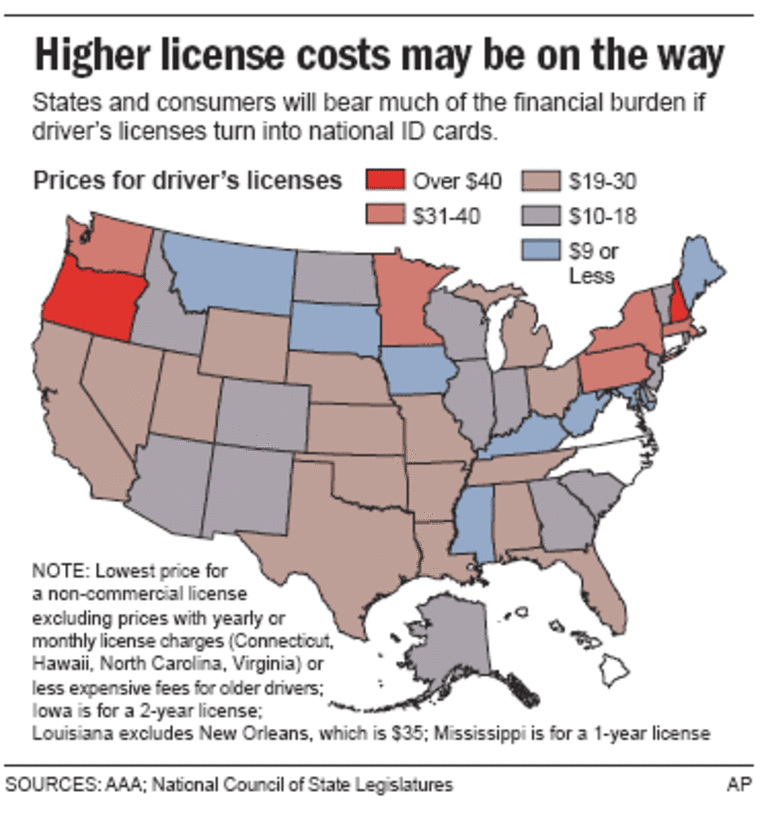Fees for a new driver’s license could triple. Lines at motor vehicles offices could stretch out the door. Governors warned Monday that states and consumers would bear much of the burden for a terrorism-driven push to turn licenses into a national ID card.
“It’s a huge problem,” said Democrat Ed Rendell of Pennsylvania. “Trying to make this work, there will be hell to pay.” He said it would cost his state “$100 million-plus” to restructure motor vehicle offices to respond to a new federal law called the REAL ID Act.
The law that passed in June as part of an $82 billion military spending bill goes beyond an earlier measure that sought to standardize state driver’s licenses. By 2008, states must begin to verify whether license applicants are American citizens or legal residents of the United States.
That deadline brought the first question in a closed-door session between governors and federal officials on homeland security Monday at the National Governors Association meeting.
The two groups also talked about pressures on National Guard troops, and steps to better integrate state and local law enforcement with federal efforts to prevent terrorist attacks, governors said as they wrapped up their summer meeting.
‘National nightmare’
But the REAL ID Act prompted the strongest reaction.
“It has become a national ID card. It’s a terrible idea for the states to do it,” said Republican Mike Huckabee of Arkansas, chairman of the governors association. “They have created a national nightmare and they’ll probably be driving up the cost of the driver’s licenses by three- or four-fold.”
After meeting privately with governors, Homeland Security Secretary Michael Chertoff said the new law could create opportunities to protect people against identity theft. He also offered assurances that his agency would work cooperatively with states.
“What we want is to find a common plan that works for everybody, but we’ll also take into account the natural differences states have,” Chertoff said.
Biometric concerns
The latest law — and an earlier version that had passed last year — have brought complaints from civil liberties advocates that the new cards’ reliance on biometric identifiers such as fingerprints or retinal scans would threaten privacy.

They have warned that the documents can be stolen or altered, making identity theft easier, and that the cards could let government track people’s travels.
But governors were more concerned about the bottom line, for their budgets and for their citizens. Huckabee’s prediction: “Lines longer, price higher, frustration certainly greater.”
The federal government is essentially demanding the skills of immigration officials and FBI agents from motor vehicle clerks whose starting pay, in Arkansas, is $8.27 an hour, he said.
The logic of the law is also flawed, said Democrat Bill Richardson of New Mexico, because denying illegal immigrants a driver’s license just makes it harder for government and law enforcement to keep track of them.
Immigrants in New Mexico
New Mexico allows illegal immigrants to get licenses. That makes roads safer since licensed immigrants can get insured and give the state data about where they live, he said. It also helps immigrants integrate into society, he said.
“It’s working and now it could be dismantled by a shortsighted, federal unfunded mandate,” Richardson said.
Governors also met with a Veterans Affairs official and the Army general in charge of the National Guard to talk about efforts to help soldiers transition to civilian life and work after returning from war in Iraq and Afghanistan.
Republican Mike Rounds of South Dakota said he raised the need for transition services like counseling to help Guard members who’ve been through combat, without causing any damage to a soldier’s career.
Wanted: Jobs for soldiers
Governors sought to find ways to help returning soldiers find work by encouraging employers to give them higher preference, Huckabee said. The average rate of unemployment for returning soldiers and Guard members is 14 percent, and it’s even higher for younger members, he said.
“If there’s anybody that ought to be assured they can find work, it’s these guys that just returned from serving their nation,” he said.